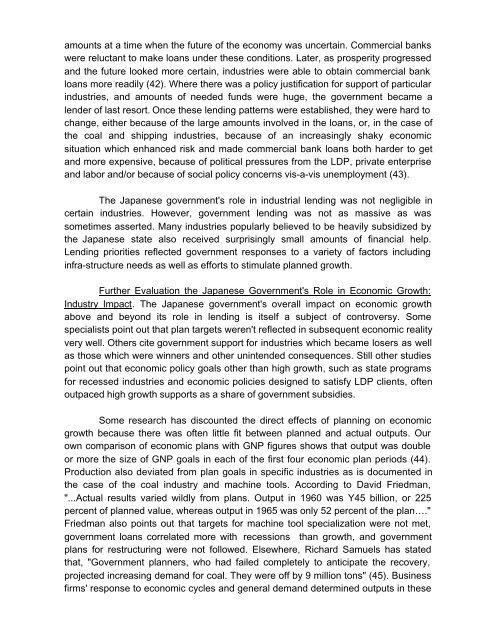The Political Economy of Japan Bradley M. RICHARDSON
The Political Economy of Japan Bradley M. RICHARDSON
The Political Economy of Japan Bradley M. RICHARDSON
- No tags were found...
You also want an ePaper? Increase the reach of your titles
YUMPU automatically turns print PDFs into web optimized ePapers that Google loves.
amounts at a time when the future <strong>of</strong> the economy was uncertain. Commercial bankswere reluctant to make loans under these conditions. Later, as prosperity progressedand the future looked more certain, industries were able to obtain commercial bankloans more readily (42). Where there was a policy justification for support <strong>of</strong> particularindustries, and amounts <strong>of</strong> needed funds were huge, the government became alender <strong>of</strong> last resort. Once these lending patterns were established, they were hard tochange, either because <strong>of</strong> the large amounts involved in the loans, or, in the case <strong>of</strong>the coal and shipping industries, because <strong>of</strong> an increasingly shaky economicsituation which enhanced risk and made commercial bank loans both harder to getand more expensive, because <strong>of</strong> political pressures from the LDP, private enterpriseand labor and/or because <strong>of</strong> social policy concerns vis-a-vis unemployment (43).<strong>The</strong> <strong>Japan</strong>ese government's role in industrial lending was not negligible incertain industries. However, government lending was not as massive as wassometimes asserted. Many industries popularly believed to be heavily subsidized bythe <strong>Japan</strong>ese state also received surprisingly small amounts <strong>of</strong> financial help.Lending priorities reflected government responses to a variety <strong>of</strong> factors includinginfra-structure needs as well as efforts to stimulate planned growth.Further Evaluation the <strong>Japan</strong>ese Government's Role in Economic Growth:Industry Impact. <strong>The</strong> <strong>Japan</strong>ese government's overall impact on economic growthabove and beyond its role in lending is itself a subject <strong>of</strong> controversy. Somespecialists point out that plan targets weren't reflected in subsequent economic realityvery well. Others cite government support for industries which became losers as wellas those which were winners and other unintended consequences. Still other studiespoint out that economic policy goals other than high growth, such as state programsfor recessed industries and economic policies designed to satisfy LDP clients, <strong>of</strong>tenoutpaced high growth supports as a share <strong>of</strong> government subsidies.Some research has discounted the direct effects <strong>of</strong> planning on economicgrowth because there was <strong>of</strong>ten little fit between planned and actual outputs. Ourown comparison <strong>of</strong> economic plans with GNP figures shows that output was doubleor more the size <strong>of</strong> GNP goals in each <strong>of</strong> the first four economic plan periods (44).Production also deviated from plan goals in specific industries as is documented inthe case <strong>of</strong> the coal industry and machine tools. According to David Friedman,"...Actual results varied wildly from plans. Output in 1960 was Y45 billion, or 225percent <strong>of</strong> planned value, whereas output in 1965 was only 52 percent <strong>of</strong> the plan…."Friedman also points out that targets for machine tool specialization were not met,government loans correlated more with recessions than growth, and governmentplans for restructuring were not followed. Elsewhere, Richard Samuels has statedthat, "Government planners, who had failed completely to anticipate the recovery,projected increasing demand for coal. <strong>The</strong>y were <strong>of</strong>f by 9 million tons" (45). Businessfirms' response to economic cycles and general demand determined outputs in these
















